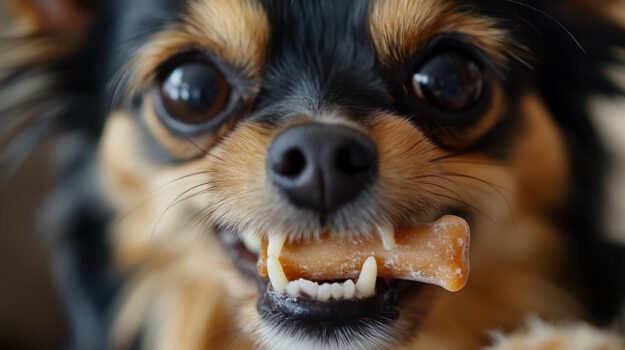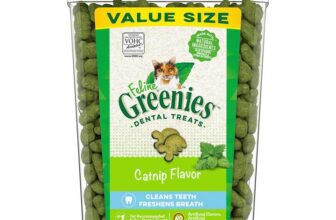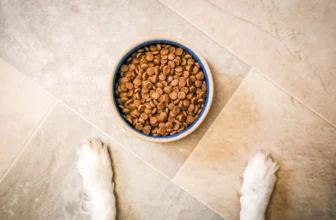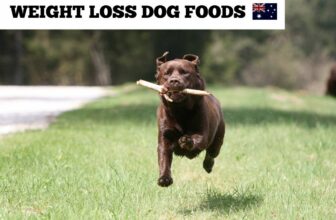Dog Dental Chews: Which really work?

If you’re concerned about plaque, tartar, or bad breath, then you should be – dental disease is one of the most overlooked health issues with our cats and dogs.
Veterinarians see cats and dogs with rotten teeth far too often, but fail to address the main reasons why – diet and type of dog food.
Perhaps your vet has recommended dental chews to combat the problem?
The truth is there are ways to truly help your dog maintain healthy teeth and gums, but you may be surprised to know most dog dental chews for dogs do not tackle the real problem, and may raise other health concerns.
Dental diets from Hill’s or Royal Canin may not be a real solution either, so I will cover those brands as well.
If you want to know what will truly benefit your dog’s dental health, then read on.
The truth and dental chews for dogs
Did you know most dog dental chews are made from ingredients which aren’t very healthy for your dog?
In fact, when you read the small print on the packaging, it’s often just the “texture” of the chew which may help clean your dog’s teeth.
(Note the word may, as it’s not even guaranteed)
Let’s take a quick look at dental chews for dogs sold in Australia and some of their main ingredients.
For each brand, consider whether the main ingredients are appropriate for your dog as a species from the Order Carnivora:
- Greenies (Mars) – main ingredients include wheat flour, wheat gluten, glycerin, gelatin.
- Pedigree Dentastix (Mars) – Main ingredients include cereals, humectant, starch.
- Whimzees (WellPet) – Main ingredients include potato starch, glycerine, powdered cellulose.
- OraVet (Boehringer Ingelheim) – Main ingredients include gelatin, vegetable glycerin, wheat gluten, soy flour, rice flour, corn oil.
- Veggiedent FR3SH (Virbac) – Main ingredients include corn starch, glycerine, soya protein concentrate, rice flour, beer yeast.
Nothing say “fresh breath” like wheat gluten, powdered cellulose, glycerin, and a little gelatin, does it?
You’re probably starting to see why I see these “dental treats” as little more than a gimmick to profit from the poor dental health of your poor pooch.
Let’s consider why your dog (or cat) may have poor dental health in the first place – which is likely the result of pet food:
The truth about dental disease and dog food
Have you heard kibble is good for your dog’s teeth?
Ask yourself this – If your doctor told you to eat a hard processed food daily to keep your teeth clean, would you see that as ridiculous?
It’s ridiculous, right?
Marketing has a lot to answer for, and it’s easy to market a kibble made mostly of grains for your meat-loving dog by saying it will help benefit their teeth.
Wet and soft dog foods are the worst culprit for poor dental health in dogs. I find this to be more prevalent in small breed dogs, likely because it would cost a fortune feeding larger breeds wet food which is often more expensive.
Veterinarians like Dr Tom Lonsdale of Bligh Park Pet Health Centre in Sydney regularly sees cats and dogs suffering from poor dental health, sometimes barely out of adolescence, which he attributes to convenience pet food.
As a pet owner, it’s worth keeping in mind commercial dog and cat food isn’t the answer when it comes to the dental health of your pet.
Better solutions are as follows…
Some of the best dental chews for dogs (in Australia)
If your dog has plaque and tartar (which is something we should be in the habit of checking regularly), our options are as follows:
- Consider the diet we’re feeding them, and improve it if possible.
- Invest in dental chews which will really help your dog – namely tough, meat-based chews.
- Consider appropriate raw meaty bones (discussed below).
In Australia we have some excellent meat-based chews which will not only help improve their dental health by scraping off plaque and tartar, but unlike the “dental treats” mentioned earlier are made from ingredients which are beneficial for your dog’s health.
Below are some dental chews which should be more effective than any “dental treat” made from cereals and glycerin. Note there are many other options, so feel free to recommend others in the comments.
ZIWI Peak Oral Health Chews
Made only from dried animal ingredients, the Oral Health Chews from ZIWI Peak are a great dental chew for two reasons – (1) they will naturally clean your dog’s teeth, and (2) each variety of treat will benefit your dog’s health in other ways.
Options include green tripe, beef weasand, trachea, lung & kidney, and liver coated lamb ears.
These foods made sound gross to you, but they’re excellent, natural, and beneficial for our dogs.
Nature’s Cut Beef Tendon
There are a variety of chews made purely from animal products, such as deer tendon, beef tendon, goat horns, bully sticks, antlers, and so forth.
These are all good options, but I recommend avoiding brands which are imported due to irradiation regulations and quality control concerns.
Nature’s Cut Beef Tendon is one good option being 100% Australian beef tendons and long lasting (they should keep your dog happy and occupied for hours).
Bell & Bone Collagen Sticks
Although the Bell & Bone chews aren’t entirely meat based (around 26% meat), they prove a softer alternative for smaller breed dogs with the added benefits of collagen and other healthy ingredients.
The “Beef & Manuka Honey” chews contain 6.5% collagen which will support strong teeth and gums, and healthy joints and coat as well.
Why not consider nature’s natural dog chews – raw meaty bones?
I’m a big advocate of raw food diets for dogs and cats because it’s the diet nature intended for them.
Wild carnivores have impeccable teeth for the simple reason chewing on flesh and bone is nature’s way of keeping their teeth clean.
Yes, there are risks of raw feeding, so if you have concerns or don’t wish to go down this route then opt for one of the commercial treats above, but if not then raw meaty bones are often a cost-effective and simple solution which will benefit both dental health and nutrition for your dog or cat.
What raw meaty bones are appropriate for your dog will depend on their size, breed, and eating habits, but for my Border Collie (and tabby cat) chicken necks, drumsticks, or chicken frames are often on the menu, as our various types of meat and organs.
What dental chew would be better for your dog than one nature intended?
Why I don’t recommend Hill’s Prescription Diet t/d Dental, Hill’s Science Diet Oral Care, or Royal Canin Dental Care
These brands are often recommended by veterinarians when your dog or cat is suffering poor dental health, so why does my opinion differ?
Firstly, I don’t see a processed pet food as a real solution to dental health problems which were likely caused by processed pet food in the first place.
Secondly, I see dogs as carnivorous (cats are factually carnivores), so ingredients such as rice, corn, maize flour, powdered cellulose, or soybean mill run simply don’t comply with my views as a certified pet nutritionist – or even common sense.
“Oral care shape” or “texture” shouldn’t be considered a good enough selling point to fix dental health issues, yet these are often the marketing angle used by dental diets and dental chews.
Even if there is some evidence a dental diet or dental chew may help reduce plaque and tartar, there is still the question whether the ingredients used – such as glycerin, wheat, or corn – are healthy for your dog or cat.
A dental diet or dental chew may sound like they’ll fix the problem your pet is currently suffering from, but are they a real fix?

Join the Reddit community r/HealthyAussiePets







what about mighty munch dental sticks
I have a Cavoodle & a spoodle… they don’t have bad breath but plaque on their teeth! The 11kg spoodle chews anything all the time, but the 3kg Cavoodle nothing! so I use seaweed meal on their dinner & brush their teeth but I am still seeing no improvement with their plaque on their teeth! Really annoying not finding what will work to give them nice clean white teeth?
Hi Denise, have you tried raw meaty bones or meaty chews? Chicken necks or wings?
The more mechanical abrasion the better, although many dogs opt to chew on one side of their mouth which can lead to plaque on the other side.
Having 6 small dogs (Tibetan Spaniels and Havanese) I am very concerned with dental hygiene. We are using the seaweed treatment and it seems to work well. We have gone off the chicken necks as some of them try to swallow whole! I have been cutting up and de-fatting brisket when I can get it but have just come back from spending $5,500 at the vets. One of the 2 year olds got a sizeable chunk of bone caught at the base of his aesophagas. Looking at your recommendations trying to learn more. Thank you for your good work. I recommend your site to other dog people.
Hi David,
Have tried using seaweed also but don’t think it’s doing anything? Mine still have plaque build up.. can you show or tell me which seaweed product you are having success with please?
Despite giving our dogs regular brisket bones or chicken wings, they still have a little plaque build up. I have just started them on Norweigan Kelp after reading about its benefits. Early days, but have noticed some improvement already. Particularly no bad breath. Just thought it worth mentioning. Cheers for a great website btw! I have been relying on your reviews for a few years now.
Hi Emma ,..
Have tried using seaweed also but don’t think it’s doing anything? Mine still have plaque build up.. can you show or tell me which seaweed product you are having success with please?
Thanks Emma, it’s great to hear the kelp is working alongside the raw bones. I’m always skeptical of research into these things, but that said PlaqueOff has certainly become popular recently (which is kelp/ascophyllum nodosum based). I should start using it myself!
Thank you David for some intelligent info on dog chews. I live in U.S and should have known that I would only find the answers from someone out of my country.
After many years of owning dogs and cats, I finally realized what vets were telling me and what the commercialized pet food industry was marketing was all wrong.
The pet food industry is worth billions at the expense of our precious pets and it overides any common sense.
So many products do more harm than good to our pets.
The more we can feed our pets fresh foods and meats the better. The commercial foods do help rot their teeth and cause more health issues.
Great read David, I have 2 Chihuahuas and a Cavalier and they love something to chew. They all have great teeth but I too have wondered how the dental treats like Dentastix and Greenies are affecting their bodies because of the ingredients. I used to give them raw chicken bones – wing bits for the Chi’s and a wing drumette for my Cav but the vet advised that raw chicken is not good for dogs because of the potential bacteria. I was surprised at this as I have always fed my dogs (over the last 30 plus years) raw chicken which is a natural food for them and this seems to be recent thinking for vets as vets used to always recommended it as a healthy chew for them before. That is why I moved to the commercial dental chews. I have given them other raw bones – beef ribs etc.. – but it is difficult finding raw bones small enough for the Chi’s 🙂 What’s your thoughts on raw chicken bones for dogs?
Hi Linda, I see it as a problem with the pet food industry influencing veterinary studies. We grow up learning about the risks of raw chicken, so it’s easy to convince veterinary students raw meats are bad for our pets and they should recommend products made of wheat and glycerin instead. We have a tendency to take what we’re taught as fact, and never question it.
Yes, there are risks from bacteria – although more to us than our pets – and also inappropriate or cooked bones. I’ve been feeding my pets raw chicken and chicken bones for decades without any issues whatsoever.